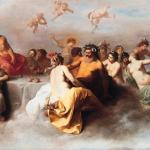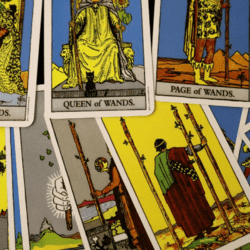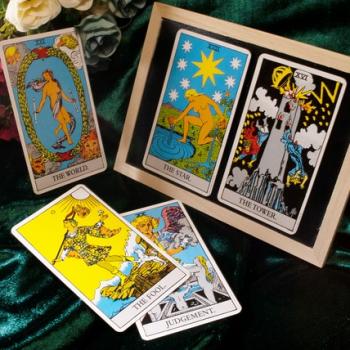“I love getting tarot readings,” said a friend recently, “they’ve saved me thousands of dollars in therapy!”
Uhm, no.
I’m not here to say that one self-improvement system is necessarily better or more useful or more anything than the other. I do believe that, while both systems might share some common elements, there are significant differences between effective, ethical tarot readings and effective formalized therapy, and to equate them can do a disservice to all involved.
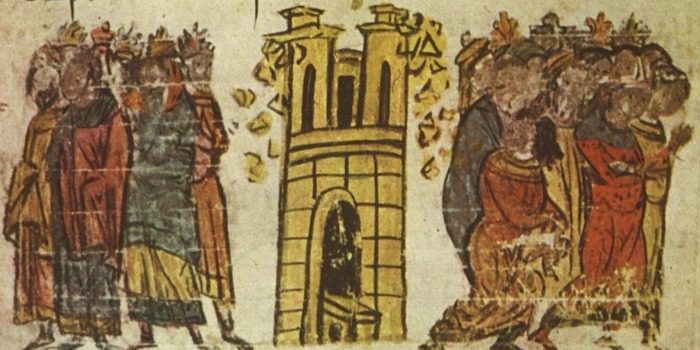
James Connachie, a British journalist, author, editor and broadcaster, writes in his article The truth about tarot, “[Tarot] is a system for describing aspirations and emotional concerns. It is a closed system rather than one based on evidence but, as such, it is not dissimilar to psychoanalysis, another highly systematised, invented tradition whose clinical efficacy depends ultimately on the relationship between client and practitioner.”
He adds, “[The cards] are, however, a fairly unique remnant of the esoteric wisdom traditions of the European Renaissance, and they offer a form of informal, popular, easily accessed therapy. Meditating on the meaning and relevance of the four virtues, of Time, Love and Death, of the Hanged Man, the Angel and the Wheel of Fortune, can be valuable. The same is true, even, of meditating on the Fool.”
This brings me to the first thing effective tarot readings and effective therapy have in common: generally, people who ask for a reading/enter therapy do so because they’re looking for some sort of guidance or help in reaching a personal insight (or, in the case of some therapeutic situations, because they have been ordered to do so by a civil court).
As the sessions continue, a relationship is forged between the client and the reader/therapist, a relationship that is enhanced by openness and certain amount of vulnerability on the part of the client and careful observation and/or use of training or learned skills on the part of the reader/therapist.
But here is a point where tarot and formalized therapy diverge: your tarot practitioner, as insightful and intuitive and s/he may be, does not serve the function of helping to hold you accountable for your choices. S/he can offer you fresh insights to aspects of your character (or of a situation) about which you may be unaware which you can then act upon to reshape how you approach your decision-making, and that’s a pretty positive benefit. But, for the most part, your practitioner does not work with you to formulate behavior plans, co-discern coping strategies, connect you with support groups, or work with you on family of origin issues.
Your practitioner can be the most empathetic, positive influence in your life. So can your therapist—another point in common. More commonalities: both your practitioner and your therapist likely have years of training that serves to inform the interactions they have with you; both likely participate in continuing education opportunities to keep their reading/counseling skills sharp; both likely consult with professional colleagues on occasion when faced with a quandary posed by a particular client while maintaining your privacy (therapists because they are legally required to do so through HIPAA; practitioners, not being bound by the same laws, because it’s Best Practice).
Benebell Wen writes in her superb book, Holistic Tarot, “Observance to a strict code of ethics is necessary. […] A Seeker’s reading should remain strictly confidential. A Seeker’s identity should also remain confidential, unless express permission is given by the Seeker to the practitioner to reveal such information. Just as there are doctor-patient, attorney-client, and priest-penitent privileges, there is a privilege and duty of confidentiality between the tarot practitioner and Seeker as well. Even if one might not be recognized by the laws of the land, the true tarot practitioner should uphold the standard for him- or herself, out of respect for the practice and the profession.”
Wen continues, “Tarot practitioners may be consulted by Seekers in tandem with professional counseling, though tarot should never be used as a replacement for a licensed psychologist or therapist. […] [T]he ethical tarot practitioner will emphasize repeatedly to the Seeker that nothing in tarot can replace professional legal, medical, financial, or psychological counseling.”
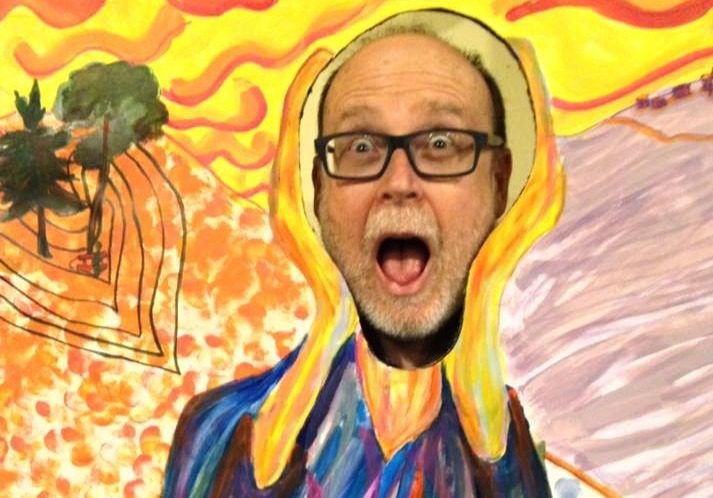
Tarot cards can be used as part of a therapist’s toolkit when working with clients. In Using Tarot in Psychotherapy Jessica Dore writes, “Just like the Rorschach and Thematic Apperception tests, a set of classic tarot cards portrays ambiguous images of humans in a wide range of situations. Though tarot cards do not function in quite the same ways as projective testing methods, when the cards are used correctly, they can help to better understand the patients, and to help them to better understand themselves.”
In these settings, the cards are not so much used in readings (such as a practitioner might offer) as they are offered individually for personal reflection and insight as part of a broader therapeutic system. Their language of metaphor is independently powerful regardless of who is using them as a tool of discernment, experienced practitioner or trained therapist.
I offer tarot readings to folks who request them, and I’m told I give effective readings. I ask Seekers to hold their query in their hearts as they shuffle the cards, and I tell them that I don’t necessarily need to know what their question is, because when I do a reading I am telling the story that the cards tell me.
I talk about elemental dignities, and qualities associated with the Suits, and overall balance between receptive and active energies, between Major and Minor Arcana and Court cards, but overall the reading is informed by the relationships and flows of energies I see in the cards. I check in frequently during the reading to see if what I’m saying makes sense to the Seeker; 8 to 9 times out of 10, it does. This approach safeguards both me and the Seeker, helping to ensure that appropriate interpersonal boundaries are observed and respected. I’m a tarot practitioner, not a therapist.
So, are tarot readings an equal substitute for therapy? Nope, not in my Little White Book. Is one method better than the other? Not necessarily. Does therapy offer opportunities for genuine personal growth? Absolutely. And does tarot as well? Absolutely.


